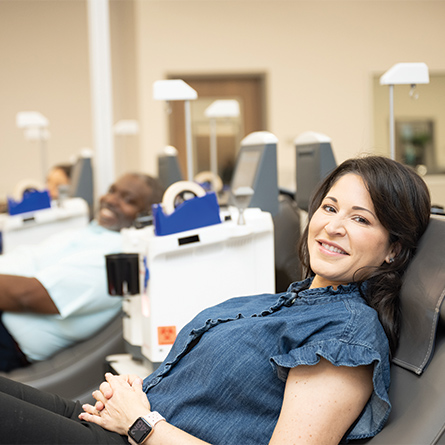HELP PEOPLE WITH RARE
AND LIFE-THREATENING CONDITIONS
Our Programs Allow You to Support Individuals with Rare Diseases and Get Rewarded
Plasma Donation
Plasma is used to produce therapies that treat people with rare, chronic diseases, and disorders such as primary immunodeficiency, hemophilia, and genetic lung disease, as well as in the treatment of specific conditions including RH incompatibility, animal bites, trauma, burns, shock, and organ transplants.
Our experienced medical team uses automated plasma collection equipment and makes every effort to ensure a secure and comfortable donation experience for you, as well as compensation for your time.

Specialty Programs
Certain diseases require specific plasma-based medications containing precise levels of particular antibodies. To address these needs, we have created specialty donation programs.
Anti-D Program
People with Rh Negative blood type play a crucial role in preventing Hemolytic Disease of the Newborn. By donating plasma, those with Rh-negative blood types provide the antibodies necessary for producing medication that safeguards babies at risk. This medication is administered to mothers during and after pregnancy to prevent immune rejection of their baby’s Rh-positive blood.
Human plasma donors are the sole source of this lifesaving treatment. Kamada Plasma stands among the select few centers collecting plasma from Rh-negative donors for Rho(D) Immunoglobulin medication. With the dedicated contributions of our plasma donors, countless mothers and babies have been shielded from potential harm.
If you have Rh-negative blood, consider reaching out to us regarding plasma donation eligibility.


Anti-Rabies Program
Rabies is a fatal but preventable viral disease primarily spread through bites or scratches from rabid animals. In the U.S., it is commonly found in wildlife like bats, raccoons, skunks, and foxes.
The virus attacks the central nervous system and, without prompt medical intervention, can lead to brain inflammation and death. Human rabies immune globulin (HRIG) is crucial after potential exposure, providing immediate antibodies alongside the rabies vaccine to activate the body’s immune response.
In the Anti-rabies program, any blood type may contribute to producing this vital medication.
Frequently Asked Questions
- What are plasma donations used for?Plasma is vital in treating various rare and chronic conditions such as immune deficiencies, and bleeding disorders as well as in the treatment of specific conditions including RH incompatibility, animal bites, trauma, burns, shock, and organ transplants. Furthermore, rare blood products are crucial for producing medications and blood typing reagents essential for identifying blood types and ensuring compatibility before transfusions. Unfortunately, there is currently a shortage of committed donors in the medical community.
- What are specialty plasma donation programs?While plasma donations are crucial for a broad array of medications, specific diseases necessitate precise levels of particular antibodies for treatment creation. To formulate these medications, donors whose plasma aligns with these distinct needs are sought.
- Can I donate for both normal source and specialty plasma programs?No, each donor can only participate in one of the programs.
- What does it mean to have an Rh-negative blood type?Human blood is categorized into two main systems: ABO (A, B, O) and the Rhesus factor (Rh). The Rh factor, a protein found on red blood cells, determines whether an individual's blood type is Rh-positive or Rh-negative. While most people have an Rh-positive blood type, being Rh-negative is generally not a health concern and has minimal impact on overall well-being. However, during pregnancy, having an Rh-negative blood type can potentially affect the baby of an expectant mother. Donating Rh-negative plasma can be critical in saving infants' lives.
- How does anti-D treatment protect women and children?Anti-D treatment prevents Rhesus disease by protecting RhD-negative mothers from developing antibodies against RhD-positive fetal blood. This immunoglobulin neutralizes any RhD-positive antigens that enter the mother's bloodstream during pregnancy or childbirth. By preventing sensitization, anti-D safeguards both current and future pregnancies, protecting newborns from potentially severe complications. It's administered prophylactically during the third trimester and after potential fetal-maternal blood mixing events, effectively reducing the risk of Hemolytic disease in newborns.
- What makes rabies so deadly?Rabies stands as the most deadly virus globally, claiming tens of thousands of lives annually. Primarily afflicting children, this disease often leads to fatal consequences. However, it is entirely preventable with prompt administration of treatment, mainly through vaccination.
- Why is prompt treatment of rabies essential?Rabies targets the nervous system, affecting the brain and spinal cord. Initial symptoms mimic a mild flu-like illness, with fever, headache, and general discomfort. However, within days, it can escalate to anxiety, confusion, agitation, abnormal behavior, delirium, and hallucinations. Once symptoms appear, rabies is nearly always fatal. Therefore, individuals exposed to potentially rabid animals through bites, scratches, or saliva contact should urgently seek post-exposure medical treatment from a physician.